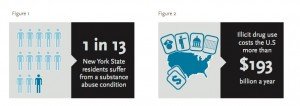How should we respond to drug users – with jail or treatment? Is a public health approach to drug use a way to resist criminalization? Or, does public health just replicate control in new forms? These are some of the issues raised when people talk about public health and criminalization, and this has been an important week for talking about these issues.
Just yesterday, the Drug Policy Alliance and the New York Academy of Medicine released their Blueprint for a Public Health and Safety Approach to Drug Policy (pdf). A multi-year effort, the Blueprint makes a strong case for what they call a “four pillar approach” to drug policy. The pillars are: prevention, treatment, harm reduction, and public safety. The first three of these – prevention, treatment and harm reduction (such as syringe exchange) – are rooted in public health responses to drugs rather than the “lock them up and throw away the key” approach of the last 30 years.
On Monday, the day before the Blueprint release, I took part in a round table conversation with a mixture of academics, activists, and journalists about these same issues. In a small group we tackled the following question: is public health resisting or expanding criminalization?
As each of us went around the table to introduce ourselves, I realized that there was a mixture of historians, lawyers, LGBTQ activists, public health professors, and journalists that made for an engaging, lively discussion.
The conversation opened with a declarative statement: the public health model is concerned with communities and populations, not individual behavior. “The criminal justice model is an individual behavior model,” said Ernie Drucker, author of Plague of Prisons, “and that’s why we should not use the criminal justice model to address issues of drug use and addiction.” Others agreed, but pointed out that public health has been a coercive tool and that it was important to be skeptical of behavior control methods being practiced under the guise of public health.
This part of the discussion produced more questions than answers. We wondered, how would public health drug policies be any different than criminal justice drug policies? What were the public health options for addressing drug use and addiction? Would public health officials be better suited for the problems of addiction than criminal justice officials? 
(You can see more of the Twitter updates from this session here.)
Rebecca Tiger (@rtigernyc), author of Judging Addicts: Drug Courts and Coercion in the Justice System, was especially wary of turning the problem of drug use and addition over to public health without some critical examination of the history of public health practices.
(You can see more of the Twitter updates from this session here.)
Recognizing that public health has increasingly focused on individual behavior change, the group questioned when public health began to focus on behavior modification. I suggested that the visual anti-tuberculosis campaigns in early twentieth century, which aggressively targeted individuals with posters that told them to stop behaviors such as spitting and coughing, could have been the beginning of the use of mass media for individual behavior change.
Rebecca Tiger questioned how the media contributes to the public discourse about drugs in the United States. In response, Sandeep Junnarkar talked about how he encourages his students to move away from mass media and focus their own blogs or even radio blogs. Rebecca said she thought the mass media has been perpetuating the “criminalization conversation” and one of the biggest obstacle in switching the conversation towards decriminalization and public health. By encouraging his students to think more broadly about where they publish their work, Sandeep said he hopes there will be a new generation of journalists that can help sway the conversation.
(You can see more of the Twitter updates from this session here.)
The conversation cycled back to a discussion of the American public health framework when someone brought up the legacy of Progressive Era reform movements on present day public health. There were those who adamantly declared that public health was necessarily population and community based and those who were wary of public health practices. Clearly, we had not come to a consensus about the role of public health in decriminalization efforts.
The conversation, appropriately, raised more questions than it answered. Ernie Drucker said that part of the solution to the many questions and problems raised in the discussion was to have more cross boundary/cross disciplinary conversations like this one.
I completely agree.
You can see the archived livestream of our discussion here. And, soon, we’ll have a more polished, edited video.
If you’re in the Buffalo, NY area and want to continue this conversation, you’ll want to attend this conference, May 2-3, at the Baldy Center for Law & Policy. FREE and open to the public.





